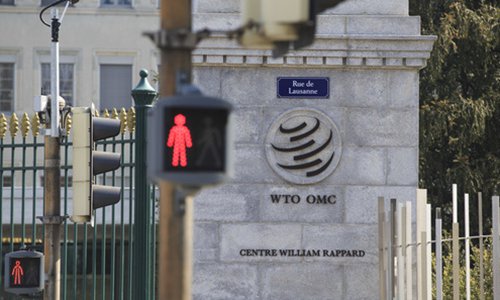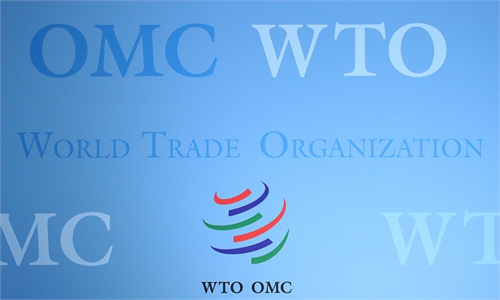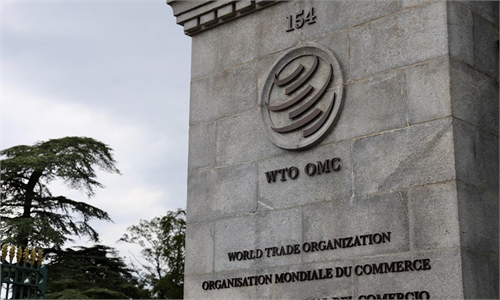US’ appeal against WTO China tariff ruling ‘a slap in the face’: experts
Washington’s moves reveal hypocrisy, lead to dysfunctional Appellate Body

File photo taken on April 2, 2019 shows the WTO logo on the main gate of the World Trade Organization (WTO) in Geneva, Switzerland. (Xinhua/Xu Jinquan)
The Trump administration's appeal against a WTO ruling on US trade tariffs imposed on China has no practical effect because the organization's Appellate Body has become dysfunctional thanks to the US' previous efforts to hobble it, experts told the Global Times on Tuesday.
As Washington turns to the multilateral trade system which it has railed against for years, the appeal reveals the hypocrisy and double-dealing nature of the US government, they said.
Meanwhile, China should respect and welcome the move, knowing that the WTO's decision will be fair and objective, and that the US is to lose the appeal.
Bloomberg reported on Monday that the Trump administration had appealed a WTO dispute ruling that said American tariffs on more than $234 billion of Chinese exports violated international rules.
"The US' appeal is expected, otherwise it would mean tacit consent by the US side that it had violated global trade rules in initiating the tariffs war against China. In that case, the US should remove all the punitive tariffs imposed on Chinese products over the past two years," said Gao Lingyun, an expert at the Chinese Academy of Social Sciences in Beijing.
In September, a panel of WTO experts ruled that Washington's tariffs on more than $200 billion worth of Chinese products imposed under the US' Section 301 Domestic Trade Act, violated global trade regulations, offering a big win to China and a major blow to the US government.
"In light of its conclusion that the US has not adequately explained how the measures chosen by it are necessary to protect public morals, the US has not met its burden of demonstrating that the measures are provisionally justified," the WTO panel said in a statement.
The US has 60 days to appeal the decision under WTO rules.
"Such an appeal is brazen and frankly a slap in the face, since the WTO's dispute settlement system has been paralyzed as a result of the US government's moves," Tu Xinquan, president of the China Institute for WTO Studies at the University of International Business and Economics, told the Global Times on Tuesday.
"It means the appeal won't be reviewed anytime soon, and the case might be unresolved for a long time," Tu said.
The Appellate Body, an important element of the Dispute Settlement System of the WTO, is an appeals court presided over by seven judges. The body has had only one judge since December 2019 due to repeated blockage of nominations by the US, which is unhappy with the court's "overreach".
Sang Baichuan, an economics professor at the University of International Business and Economics, told the Global Times on Tuesday that the US' move to appeal the verdict showed the US' hypocrisy and extreme egoism. When it thought the WTO's system and rules "harmed" its interests, it stepped up pressure to cripple the organization, but now that the system has become its only chance to appeal, it's now clinging on to it.
"China should have confidence that the WTO will offer fair and objective judgment after the US appeal. And we have reason to believe that the US will lose its appeal," said Sang.
Following the WTO ruling in September, China's Ministry of Commerce said in a statement that China always respects the WTO's rulings and hopes the US can respect the expert panel's verdict, as well as take concrete actions to meet China and other WTO members halfway to preserve the multilateral trade system.
"Whatever happens, we should respect the US' right to lodge an appeal and extend a welcome gesture toward its returning to the multilateral system to resolve problems, while hoping that the US would halt its ill-intentioned behavior to hobble the rules-based body," said Gao.
Along with defending its tariff strategy, the Trump administration said that the ruling will have no bearing on the phase one trade agreement with China, according to the Bloomberg report.
"The clarification signifies the US' concerns that the tariff verdict, which is in China's favor, would affect the implementation of the phase one deal, as the Trump administration needs it to tout at home," Gao noted.
"Our purchases have been in accordance with domestic demand for imported goods," he added.
A joint statement released by the US Trade Representative's office and the US Department of Agriculture last week said China had bought over $23 billion in US agricultural goods or about 71 percent of the target set under the phase one trade deal.



